By David Pan · Friday, April 5, 2024 Telos 206 (Spring 2024): The Intuitive and the Conceptual is now available for purchase in our store. Individual subscriptions to Telos are also available in both print and online formats.
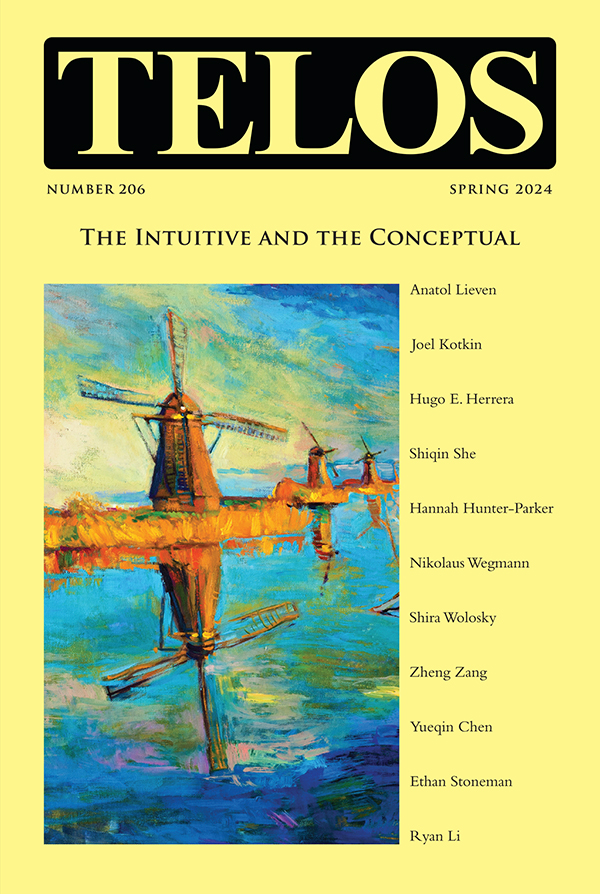 We often have the experience of intuiting something without being able to precisely define what that intuition is. Sometimes this intuition leads to a more well-defined insight, and sometimes it might lead to some kind of action, even in the absence of clear conceptual definitions. Yet it is difficult to ascertain what kind of knowledge or awareness such intuitions consist of. What is an intuition as opposed to a defined concept of something? How seriously should we take such intuitions? Are they something separate and qualitatively different than concepts? Are they just fuzzy concepts? Do they really exist at all? These are crucial questions because they lead to conclusions about the status of concepts themselves. If the alternative to clear concepts is nothing at all, then the sociopolitical corollary would be that the alternative to conceptual knowledge and the holders of such knowledge would also be nothing at all. By contrast, if intuitions are separate from concepts and real, then expert knowledge might possibly have some deficiencies in comparison with intuitions. The essays in this issue of Telos explore in one way or another this question of the status of conceptual knowledge as opposed to intuitive awareness. We often have the experience of intuiting something without being able to precisely define what that intuition is. Sometimes this intuition leads to a more well-defined insight, and sometimes it might lead to some kind of action, even in the absence of clear conceptual definitions. Yet it is difficult to ascertain what kind of knowledge or awareness such intuitions consist of. What is an intuition as opposed to a defined concept of something? How seriously should we take such intuitions? Are they something separate and qualitatively different than concepts? Are they just fuzzy concepts? Do they really exist at all? These are crucial questions because they lead to conclusions about the status of concepts themselves. If the alternative to clear concepts is nothing at all, then the sociopolitical corollary would be that the alternative to conceptual knowledge and the holders of such knowledge would also be nothing at all. By contrast, if intuitions are separate from concepts and real, then expert knowledge might possibly have some deficiencies in comparison with intuitions. The essays in this issue of Telos explore in one way or another this question of the status of conceptual knowledge as opposed to intuitive awareness.
Continue reading →
By Russell A. Berman · Monday, January 9, 2023 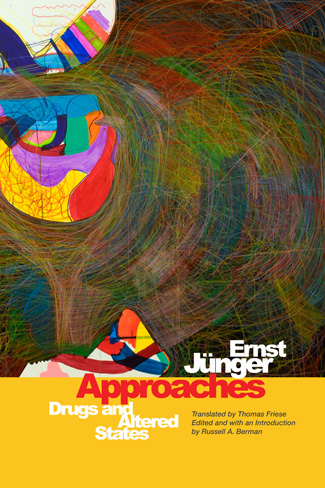 Before Timothy Leary and Baba Ram Dass, before Ken Kesey and Neal Cassady, the Merry Pranksters and their acid test, before the Grateful Dead . . . there was Ernst Jünger, adventurer in mind expansion and psychedelic space. Before Timothy Leary and Baba Ram Dass, before Ken Kesey and Neal Cassady, the Merry Pranksters and their acid test, before the Grateful Dead . . . there was Ernst Jünger, adventurer in mind expansion and psychedelic space.
Jünger stands out in this counterculture company with his thoroughly different background. As a teenager, he ran away from his German home to join the French Foreign Legion. In the First World War he was wounded multiple times and became a highly decorated officer in the Kaiser’s army. He would serve again on the German side in the Second World War—even though he published a famous anti-Hitler novel.
Yet alongside that military career, Jünger spent a lifetime with consciousness-enhancing experiments—hashish, cocaine, and morphine until he worked his way to LSD, psilocybin, and peyote. Jünger invites us to follow him on that mind-blowing path in an autobiography of his life with drugs: Approaches: Drugs and Altered States. This wide-ranging account documents an array of drug experiences, placing them in a richly intellectual context of cultural transformations and the literary history of drug use—Baudelaire, De Quincey, and Huxley—as well as art historical reflections on hallucinatory elements in Van Gogh, cubism, and surrealism. A great intellect meets psychedelics.
Continue reading →
By Telos Press · Monday, December 5, 2022 New from Telos Press: Approaches: Drugs and Altered States, by Ernst Jünger. Order the paperback edition today in our online store and save 20% by using the coupon code BOOKS20. Also available in Kindle ebook format at Amazon.com.
Approaches: Drugs and Altered States
by Ernst Jünger
Translated by Thomas Friese
Edited and with an Introduction by Russell A. Berman
 Telos Press Publishing is delighted to announce the publication of Ernst Jünger’s Approaches: Drugs and Altered States, now available in English translation. Telos Press Publishing is delighted to announce the publication of Ernst Jünger’s Approaches: Drugs and Altered States, now available in English translation.
In Approaches, Jünger describes his experiences with drugs over the course of his life, ranging from youthful drinking sprees, through experiments with hashish and morphine, to more powerful psychotropic substances like mescaline, peyote, and LSD. Taking his readers on a remarkable journey from beer to hallucinogens, he provides fascinating vignettes from key moments in Germany’s troubled twentieth century. Approaches is also a fundamentally philosophical, even spiritual journey toward hidden dimensions of existence that, in Jünger’s view, have been eclipsed by the ambient noise of modern life. The ecstatic altered states provided by drug use, he claims, can help us approach them and find a deeper truth.
Continue reading →
By Ross Etherton · Wednesday, April 29, 2020 Ross Etherton’s “Reading against the Gun: The Machine Gun and Sturm” appears in Telos 190 (Spring 2020): Economy and Ecology: Reconceiving the Human Relationship to Nature. Read the full article at the Telos Online website, or purchase a print copy of the issue in our online store. Individual subscriptions to Telos are available in both print and online formats. Ernst Jünger’s Sturm, published in English translation by Telos Press, is also available in our store.
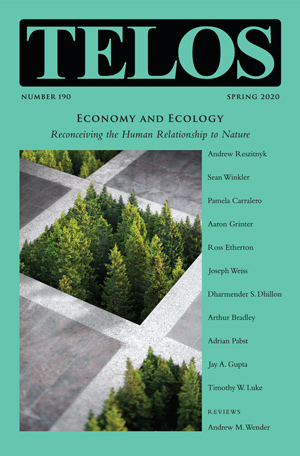 This essay examines the role of the machine gun in Ernst Jünger’s 1923 serially published novella Sturm, arguing that an examination of the novella’s key technological actant is at least as beneficial as an examination of the text’s human protagonists. It posits that reading Sturm in light of the machine gun and in the context of the material and cultural conditions of its original serial publication allows for a different understanding of the novella’s treatment of reading and writing under the conditions of modern mechanized warfare. The essay not only links the technical process at the heart of the gun (continuity derived from explosive interruption) to the explosive interruptions within the novella; it also links this interruptive continuity to the arbitrary, irregular breaks in its original serial publication. This technical-literary approach connects the literary scholarship on Sturm (primarily by Peter Uwe Hohendahl and David Pan) with one indebted to philosopher Gilbert Simondon, who sought to redress humanity’s profound alienation from technology and technical objects. The essay first outlines its approach to Sturm, and then provides readers with an overview of Sturm‘s publication history, contextualizing it within Jünger’s early works. It then examines the explosively interruptive moments of the novella, tying them to the machine gun and to nineteenth- and early twentieth-century scientific, philosophical, and poetological discourses. It closes by gesturing toward the importance that the gun and the concepts embedded in it would have for Jünger in the decade following Sturm. This essay examines the role of the machine gun in Ernst Jünger’s 1923 serially published novella Sturm, arguing that an examination of the novella’s key technological actant is at least as beneficial as an examination of the text’s human protagonists. It posits that reading Sturm in light of the machine gun and in the context of the material and cultural conditions of its original serial publication allows for a different understanding of the novella’s treatment of reading and writing under the conditions of modern mechanized warfare. The essay not only links the technical process at the heart of the gun (continuity derived from explosive interruption) to the explosive interruptions within the novella; it also links this interruptive continuity to the arbitrary, irregular breaks in its original serial publication. This technical-literary approach connects the literary scholarship on Sturm (primarily by Peter Uwe Hohendahl and David Pan) with one indebted to philosopher Gilbert Simondon, who sought to redress humanity’s profound alienation from technology and technical objects. The essay first outlines its approach to Sturm, and then provides readers with an overview of Sturm‘s publication history, contextualizing it within Jünger’s early works. It then examines the explosively interruptive moments of the novella, tying them to the machine gun and to nineteenth- and early twentieth-century scientific, philosophical, and poetological discourses. It closes by gesturing toward the importance that the gun and the concepts embedded in it would have for Jünger in the decade following Sturm.
Continue reading →
By David Pan · Monday, March 16, 2020 Telos 190 (Spring 2020): Economy and Ecology: Reconceiving the Human Relationship to Nature is now available for purchase in our store. Individual subscriptions to Telos are also available in both print and online formats.
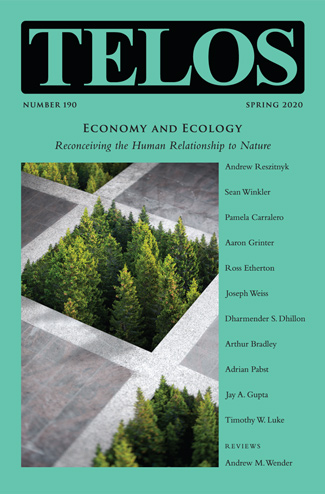 Our human relationship to nature defines our economic life. As Marx articulated in the 1844 manuscripts, labor involves an engagement with nature in order to fulfill human ends, the working up of nature as an “inorganic body.” Consequently, the world of work and that of the environment are really two aspects of our relationship to nature, and the shift in academic interest from economy to ecology as the burning issue of the day does not represent any real change in perspective. On a fundamental level, economy is ecology and vice versa. Thus, the issue of climate change is primarily one about the energy structure of our economy. If that structure before the Industrial Revolution boiled down to the way in which we were cutting down our forests, today the issue is how fossil fuels are leading to climate change. The other global natural disaster of our day, the coronavirus, has arisen as a consequence, first, of our treatment of wild animals as food and, second, of economic globalization, whose movements have established the pathways for the rapid spread of viruses. Our human relationship to nature defines our economic life. As Marx articulated in the 1844 manuscripts, labor involves an engagement with nature in order to fulfill human ends, the working up of nature as an “inorganic body.” Consequently, the world of work and that of the environment are really two aspects of our relationship to nature, and the shift in academic interest from economy to ecology as the burning issue of the day does not represent any real change in perspective. On a fundamental level, economy is ecology and vice versa. Thus, the issue of climate change is primarily one about the energy structure of our economy. If that structure before the Industrial Revolution boiled down to the way in which we were cutting down our forests, today the issue is how fossil fuels are leading to climate change. The other global natural disaster of our day, the coronavirus, has arisen as a consequence, first, of our treatment of wild animals as food and, second, of economic globalization, whose movements have established the pathways for the rapid spread of viruses.
Continue reading →
By David Pan · Monday, June 17, 2019 Telos 187 (Summer 2019) is now available for purchase in our store. Individual subscriptions to Telos are also available in both print and online formats.
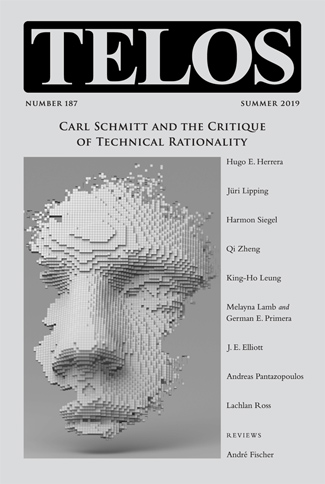 After a modern era of technological progress that has led humans to believe in their increasing ability to control nature, we are reaching a point at which this power on a small scale has given way to increasing uncertainty and uncontrollability on the large scale. Not only are the specific effects of climate change difficult to predict and control, the only mechanisms available for such control—agreement and cooperation across national and cultural divides—are not the stuff of engineering but of politics. So with every technological advance that promises to bring us more control over our lives, we as a species are facing ever greater risks and uncertainties. The question concerning technology has become the unpredictability and uncontrollability of its development itself. The key difficulty is a problem of a tension between community or national interests and species-wide interests. While there might be an ethical imperative on a species-wide level to exercise self-restraint in pursuing dangerous technologies such as nuclear weapons, gene manipulation, or coal-fired power plants, such self-restraint could very well lead to the decline or even annihilation of the group that exercises it. The path forward will not be revealed by new technological advances, which can easily create more problems than they solve, but through the development of new ethical, political, and affective frameworks by which people understand themselves and their connections to the rest of the world. This issue of Telos, devoted to Carl Schmitt and the critique of technical rationality, investigates the ways in which Schmitt’s critique moved him toward ways of considering law, politics, and human history as fundamentally uncertain movements, requiring strategies that accept such unpredictability even as we try to intervene in our historical development as a species. After a modern era of technological progress that has led humans to believe in their increasing ability to control nature, we are reaching a point at which this power on a small scale has given way to increasing uncertainty and uncontrollability on the large scale. Not only are the specific effects of climate change difficult to predict and control, the only mechanisms available for such control—agreement and cooperation across national and cultural divides—are not the stuff of engineering but of politics. So with every technological advance that promises to bring us more control over our lives, we as a species are facing ever greater risks and uncertainties. The question concerning technology has become the unpredictability and uncontrollability of its development itself. The key difficulty is a problem of a tension between community or national interests and species-wide interests. While there might be an ethical imperative on a species-wide level to exercise self-restraint in pursuing dangerous technologies such as nuclear weapons, gene manipulation, or coal-fired power plants, such self-restraint could very well lead to the decline or even annihilation of the group that exercises it. The path forward will not be revealed by new technological advances, which can easily create more problems than they solve, but through the development of new ethical, political, and affective frameworks by which people understand themselves and their connections to the rest of the world. This issue of Telos, devoted to Carl Schmitt and the critique of technical rationality, investigates the ways in which Schmitt’s critique moved him toward ways of considering law, politics, and human history as fundamentally uncertain movements, requiring strategies that accept such unpredictability even as we try to intervene in our historical development as a species.
Continue reading →
|
|
 We often have the experience of intuiting something without being able to precisely define what that intuition is. Sometimes this intuition leads to a more well-defined insight, and sometimes it might lead to some kind of action, even in the absence of clear conceptual definitions. Yet it is difficult to ascertain what kind of knowledge or awareness such intuitions consist of. What is an intuition as opposed to a defined concept of something? How seriously should we take such intuitions? Are they something separate and qualitatively different than concepts? Are they just fuzzy concepts? Do they really exist at all? These are crucial questions because they lead to conclusions about the status of concepts themselves. If the alternative to clear concepts is nothing at all, then the sociopolitical corollary would be that the alternative to conceptual knowledge and the holders of such knowledge would also be nothing at all. By contrast, if intuitions are separate from concepts and real, then expert knowledge might possibly have some deficiencies in comparison with intuitions. The essays in this issue of Telos explore in one way or another this question of the status of conceptual knowledge as opposed to intuitive awareness.
We often have the experience of intuiting something without being able to precisely define what that intuition is. Sometimes this intuition leads to a more well-defined insight, and sometimes it might lead to some kind of action, even in the absence of clear conceptual definitions. Yet it is difficult to ascertain what kind of knowledge or awareness such intuitions consist of. What is an intuition as opposed to a defined concept of something? How seriously should we take such intuitions? Are they something separate and qualitatively different than concepts? Are they just fuzzy concepts? Do they really exist at all? These are crucial questions because they lead to conclusions about the status of concepts themselves. If the alternative to clear concepts is nothing at all, then the sociopolitical corollary would be that the alternative to conceptual knowledge and the holders of such knowledge would also be nothing at all. By contrast, if intuitions are separate from concepts and real, then expert knowledge might possibly have some deficiencies in comparison with intuitions. The essays in this issue of Telos explore in one way or another this question of the status of conceptual knowledge as opposed to intuitive awareness. 










